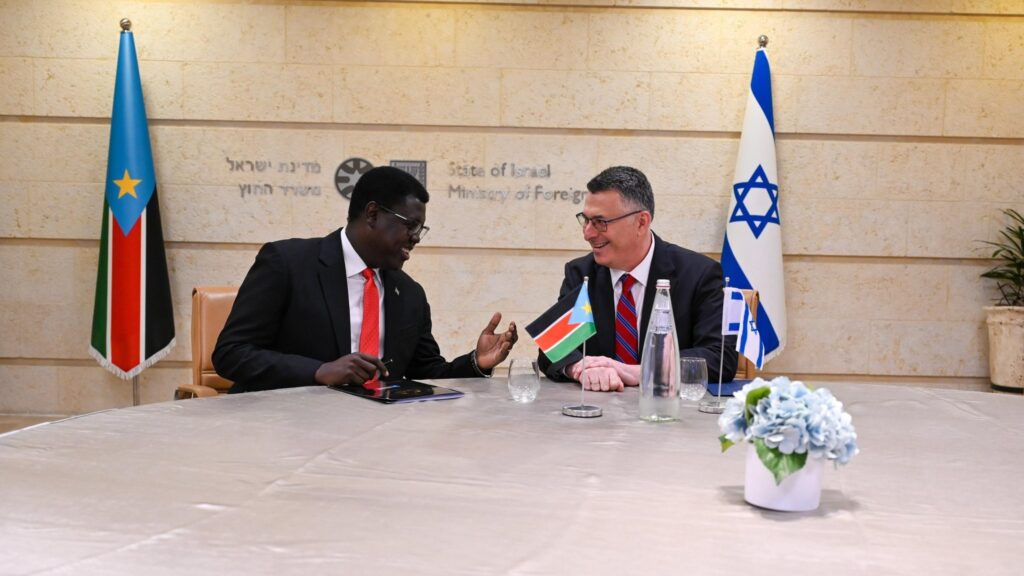South Sudan is reportedly in talks with Israel about resettling Palestinians forcibly displaced from Gaza, as Israeli representatives arrived in the East African country for an inaugural official visit.
On Tuesday evening, the Associated Press reported that talks had taken place between the two countries about transferring Palestinians, citing six sources familiar with the discussions. It is unclear how far the talks have progressed.
Joe Szlavik, a US lobbyist working with South Sudan, told AP he was briefed by South Sudanese officials on the talks, and that an Israeli delegation had planned to visit the country to explore the possibility of setting up camps for Palestinians.
Sharren Haskel, Israel’s deputy foreign minister, arrived in South Sudan on Tuesday to hold a series of meetings as part of the first ever official Israeli visit. Haskel will meet with the country’s president and foreign minister, among others.
The newspaper Israel Hayom reported that the visit was scheduled a while back, and is unrelated to recent reports about displaced Palestinians from Gaza.
New MEE newsletter: Jerusalem Dispatch
Sign up to get the latest insights and analysis on
Israel-Palestine, alongside Turkey Unpacked and other MEE newsletters
“While the international community is focused solely on Gaza, South Sudan is facing a real humanitarian crisis and the threat of genuine famine that is claiming the lives of many refugees from the war in Sudan,” Haskel said on Tuesday.
“All hunger experts in the international community and in the media [should] come here and see with their own eyes what happens when there is a real famine.”
It’s not clear if Haskel’s trip is the same delegation that Szlavik was referring to.

‘Jews Say No to Ethnic Cleansing’: Hundreds of rabbis and artists reject Trump’s Gaza plan
Read More »
Israel’s and South Sudan’s foreign ministries did not respond to questions on the talks by AP, while a US State Department spokesperson said it did not comment on private diplomatic discussions.
Two weeks ago, Gideon Saar, Israel’s foreign minister, hosted his South Sudanese counterpart in Jerusalem.
The discussions with South Sudan are part of months-long efforts by Israel to find third nations to realise US President Donald Trump’s proposal to ethnically cleanse the Palestinian enclave.
Trump said in February that Washington would “take over” the Gaza Strip and eject the Palestinian population to other countries. In the meantime, the enclave would be turned into the “Riviera of the Middle East”.
Weeks later, Israel set up a new government agency to oversee what it described as “voluntary departures”, in compliance with Trump’s proposal.
“I think that the right thing to do, even according to the laws of war as I know them, is to allow the population to leave, and then you go in with all your might against the enemy who remains there,” Israeli Prime Minister Benjamin Netanyahu told Israeli TV station i24 on Tuesday, in relation to the displacement plan. He did not mention South Sudan.
The semantics of ethnic cleansing
Experts in genocide and international law told Middle East Eye last month that Israeli officials’ talk of “voluntary emigration” should actually be read as forced displacement.
Two Egyptian officials told AP that they had known for months of Israeli efforts to find a country to take in Palestinians, including its contact with South Sudan.
The officials said that they had lobbied South Sudan against taking in displaced Palestinians.

Musk’s AI chatbot briefly suspended ‘for saying Israel is committing genocide in Gaza’
Read More »
AP previously reported that the US and Israel had reached out to officials in Sudan, Somalia and the self-governed region of Somaliland about the plans.
South Sudan has been devastated by a civil war that broke out after it gained independence from Sudan in 2011.
Around 400,000 have been killed, and the country relies on international aid to feed its population of 11 million people. A fragile peace agreement was struck seven years ago.
South Sudan faces a number of sanctions imposed by the US, including the revocation of visas for all its nationals, as well as individual sanctions on a number of figures and entities it links with threatening peace.
It is not yet known if talks with Israel about accepting ejected Palestinians are linked with sanctions relief.

